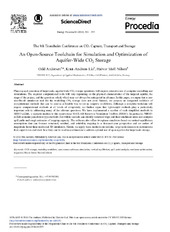An Open-Source Toolchain for Simulation and Optimization of Aquifer-Wide CO2 Storage
Peer reviewed, Journal article
Published version

Åpne
Permanent lenke
https://hdl.handle.net/1956/11782Utgivelsesdato
2016-02-04Metadata
Vis full innførselSamlinger
Originalversjon
https://doi.org/10.1016/j.egypro.2016.01.033Sammendrag
Planning and execution of large-scale, aquifer-wide CO2 storage operations will require extensive use of computer modelling and simulations. The required computational tools will vary depending on the physical characteristics of the targeted aquifer, the stage of the project, and the questions asked, which may not always be anticipated in advance. In this paper, we argue that a one-size-fits-all simulation tool for the modelling CO2 storage does not exist. Instead, we propose an integrated toolchain of computational methods that can be used in a flexible way to set up adaptive workflows. Although a complete toolchain will require computational methods at all levels of complexity, we further argue that lightweight methods play a particularly important role in addressing many of the relevant questions. We have implemented a number of such simplified methods in MRST-co2lab, a separate module to the open-source MATLAB Reservoir Simulation Toolbox (MRST). In particular, MRST-co2lab contains percolation-type methods that within seconds can identify structural traps and their catchment areas and compute spill paths and rough estimates of trapping capacity. The software also offers two-phase simulators based on vertical-equilibrium assumptions that can forecast structural, residual, and solubility trapping in a thousand-year perspective and are orders of magnitude faster than traditional 3D simulators. Herein, we apply these methods on realistic, large-scale datasets to demonstrate their capabilities and show how they can be used in combination to address optimal use of open aquifers for large-scale storage.
